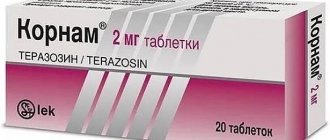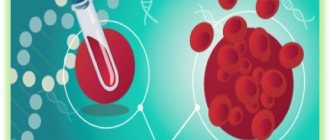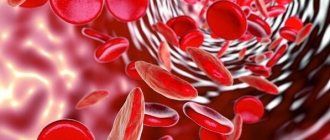Description
Extensive laboratory testing of thyroid function.
The thyroid gland is one of the most important organs of the human endocrine system. The main function of the thyroid gland is to produce thyroid hormones. They regulate most metabolic processes in the body.
Why is it important to have your thyroid examined?
The thyroid gland affects the entire body as a whole, and even the most insignificant, at first glance, deviations from the norm have an impact on the body’s metabolism, cardiac, nervous and reproductive systems. The earlier a thyroid pathology is detected, the easier it is to treat.
Why is it better to undergo a comprehensive examination?
The thyroid gland synthesizes 2 main hormones: T3 and T4, the formation of which is regulated by TSH (synthesized in the pituitary gland), it is important to see the whole picture. In addition, TG and TPO are involved in the formation of hormones in the thyroid gland, to which, in some forms of pathology, antibodies are formed in the thyroid gland, therefore, to assess the function of the thyroid gland, a comprehensive examination is necessary. The value of laboratory tests increases with simultaneous ultrasound examination (US).
Symptoms of thyroid dysfunction (in children and adults):
- Sudden weight changes.
- Unstable menstrual cycle in women and teenage girls.
- Change in appearance: problems with skin, hair, nails.
- Disorders of the gastrointestinal tract and cardiovascular systems
- Memory deterioration, slow thinking and speech.
- Increased sweating, hand tremors and increased body temperature.
- Weakness, irritability, tearfulness.
- Decreased immunity, tendency to colds.
Who should have a thyroid examination?
Everyone without exception: women and men, children.
For the purpose of prevention and if one or more of the above symptoms appear, it is recommended to undergo a comprehensive examination of the thyroid gland: take tests, undergo an ultrasound and, based on the results of the examination, consult a doctor.
Indications for the analysis of antibodies to thyroid peroxidase
A test for antibodies to the thyroid gland is prescribed as part of a comprehensive examination of patients with:
- signs of hyperthyroidism: increased nervousness, weight loss with good appetite, rapid heart rate, arrhythmia, protruding eyeballs, trembling hands, heat intolerance, shortness of breath with light exertion;
- symptoms of hypothyroidism: swelling of the face, eyelids, lethargy, drowsiness, apathy, hair loss, chilliness, weight gain with decreased appetite;
- spontaneous abortion, preeclampsia, unsuccessful IVF attempts;
- an established diagnosis of autoimmune thyroid disease to monitor the effectiveness and duration of treatment;
- an established diagnosis of other autoimmune diseases (for example, systemic lupus erythematosus, pernicious anemia, systemic autoimmune vasculitis, type 1 diabetes mellitus or rheumatoid arthritis) when signs of thyroid dysfunction appear;
- symptoms of disruption of the normal functioning of the thyroid gland and/or detected changes in test results for T3, T4, thyroid-stimulating hormone of the pituitary gland;
- the need to prescribe drugs that affect the functioning of the thyroid gland (for example, lithium, amiodarone, interferon alpha);
- family predisposition to autoimmune thyroid diseases;
- as a preventive measure in the first trimester of pregnancy to identify the risk of thyroid dysfunction during pregnancy and the development of postpartum thyroiditis.
Thyroid-stimulating hormone (TSH, thyrotropin)
A glycoprotein hormone that stimulates the formation and secretion of thyroid hormones (T3, T4).
They enter the body with food and are also synthesized by cells of adipose tissue, liver, and intestines. They do not circulate freely, but are bound to proteins and transported in the form of macromolecular complexes - lipoproteins. They are the main lipids of fatty deposits and food products. The triglyceride molecule contains triatomic glycerol and 3 residues of higher fatty acids, mainly palmitic, stearic, linoleic and oleic.
It is produced by basophils of the anterior pituitary gland under the control of thyroid-stimulating hypothalamic releasing factor, as well as somatostatin, biogenic amines and thyroid hormones. Increases vascularization of the thyroid gland. Increases the supply of iodine from blood plasma to thyroid cells, stimulates the synthesis of thyroglobulin and the release of T3 and T4 from it, and also directly stimulates the synthesis of these hormones. Enhances lipolysis.
There is an inverse logarithmic relationship between the concentrations of free T4 and TSH in the blood.
TSH is characterized by daily fluctuations in secretion: blood TSH reaches its highest values at 2 - 4 am, the highest level in the blood is also determined at 6 - 8 am, the minimum TSH values occur at 17 - 18 pm. The normal rhythm of secretion is disrupted when awake at night. During pregnancy, the concentration of the hormone increases. With age, the concentration of TSH increases slightly, and the amount of hormone emissions at night decreases.
Limits of determination:
0.0025 mU/l - 100 mU/l.
Free thyroxine (free T4)
The most important stimulator of protein synthesis.
Produced by follicular cells of the thyroid gland under the control of TSH (thyroid-stimulating hormone). It is the predecessor of T3. By increasing the basal metabolic rate, it increases heat production and oxygen consumption by all tissues of the body, with the exception of the tissues of the brain, spleen and testicles. Increases the body's need for vitamins. Stimulates the synthesis of vitamin A in the liver. Reduces the concentration of cholesterol and triglycerides in the blood, accelerates protein metabolism. Increases calcium excretion in urine, activates bone turnover, but to a greater extent, bone resorption. It has a positive chrono- and inotropic effect on the heart. Stimulates reticular formation and cortical processes in the central nervous system.
During the day, the maximum concentration of thyroxine is determined from 8 to 12 hours, the minimum - from 23 to 3 hours. During the year, maximum T4 values are observed between September and February, and minimum values are observed in the summer. Women have lower thyroxine concentrations than men. During pregnancy, the concentration of thyroxine increases, reaching maximum values in the third trimester. Levels of the hormone in men and women remain relatively constant throughout life, decreasing only after 40 years.
The concentration of free thyroxine, as a rule, remains within the normal range in severe diseases not related to the thyroid gland (the concentration of total T4 may be reduced!).
An increase in T4 levels is facilitated by high serum bilirubin concentrations, obesity, and the use of a tourniquet when drawing blood.
Limits of determination:
5.1 pmol/l - 77.2 pmol/l.
How to properly prepare for research
The test for antibodies to TPO is carried out from venous blood. We recommend:
- donate blood during the period from 8 to 11 am, on an empty stomach, after an 8-12 hour overnight fasting period;
- on the eve of the study - a light dinner with limited intake of fatty foods;
- on the day of the test, drink still water and it is better to avoid coffee and tea;
- 24 hours before the test, exclude alcoholic beverages;
- 1 hour before the test it is better to refrain from smoking;
- 24 hours before the study, exclude the use of medications (in consultation with the attending physician);
- 24 hours before the test, eliminate emotional and physical stress;
- do not donate blood immediately after radiography, ultrasound, massage, endoscopic and physiotherapeutic procedures;
- Rest for 10-20 minutes before donating blood.
Free triiodothyronine (free T3)
Thyroid hormone stimulates the exchange and absorption of oxygen by tissues (more active than T4).
Produced by follicular cells of the thyroid gland under the control of TSH (thyroid-stimulating hormone). In peripheral tissues it is formed during deiodination of T4. Free T3 is the active part of total T3, accounting for 0.2 - 0.5%.
T3 is more active than T4, but is found in the blood in lower concentrations. Increases heat production and oxygen consumption by all body tissues, with the exception of brain tissue, spleen and testicles. Stimulates the synthesis of vitamin A in the liver. Reduces the concentration of cholesterol and triglycerides in the blood, accelerates protein metabolism. Increases calcium excretion in urine, activates bone turnover, but to a greater extent, bone resorption. It has a positive chrono- and inotropic effect on the heart. Stimulates reticular formation and cortical processes in the central nervous system.
By 11–15 years, the concentration of free T3 reaches adult levels. In men and women over 65 years of age, there is a decrease in free T3 in serum and plasma. During pregnancy, T3 decreases from the first to the third trimester. One week after delivery, serum free T3 levels return to normal. Women have lower concentrations of free T3 than men by an average of 5 - 10%. Free T3 is characterized by seasonal fluctuations: the maximum level of free T3 occurs from September to February, the minimum in the summer.
Limits of determination:
1.5 pmol/l - 46.1 pmol/l.
What do the results mean?
The normal level of antibodies to TPO is up to 34 IU/ml. If a significant increase is detected, then this is a sign of autoimmune inflammation of the thyroid gland:
- thyroiditis: postpartum, Hashimoto's, newborns;
- diffuse toxic goiter.
A moderate increase in the level of antibodies to TPO can also occur in other autoimmune diseases of the thyroid gland: subacute thyroiditis, single and multiple thyroid nodules, thyroid cancer. An increase in antibodies during treatment indicates its insufficient effectiveness, while a decrease indicates the success of therapy.
Antibodies to thyroid peroxidase (AT-TPO, microsomal antibodies)
Autoantibodies to the enzyme of thyroid cells.
Antibodies to thyroid peroxidase are an indicator of the aggression of the immune system towards its own body. Thyroid peroxidase provides the formation of an active form of iodine, which can be included in the process of iodification of thyroglobulin. Antibodies to the enzyme block its activity, as a result of which the secretion of thyroid hormones (T4, T3) decreases. However, TPO Abs can only be “witnesses” of the autoimmune process.
Thyroid peroxidase antibodies are the most sensitive test for detecting autoimmune thyroid disease. Usually their appearance is the first shift that is observed in the course of developing hypothyroidism due to Hashimoto's thyroiditis. When sufficiently sensitive methods are used, TPO Abs are detected in 95% of people with Hashimoto's thyroiditis and in approximately 85% of patients with Graves' disease. Detection of AT-TPO during pregnancy indicates the risk of developing postpartum thyroiditis in the mother and a possible impact on the development of the child.
Reference limits largely depend on the research method used. Low levels of AT-TPO can sometimes be found in apparently healthy people. It remains unclear whether this may reflect a physiological norm, or is a precursor to autoimmune thyroiditis, or is a problem with the specificity of the method.
Limits of determination:
3 U/ml - 1000.0 U/ml.
What is thyroid peroxidase (TPO)
Thyroid peroxidase is an enzyme involved in the formation of thyroid hormones.
It is responsible for the most important stages of hormonal synthesis - activation of iodine (oxidizes iodide) and the combination of iodinated tyrosines in the process of synthesis of thyroxine (T4) and triiodothyronine (T3). This is a thyroid enzyme of a protein nature, it is also an antigen. With autoimmune inflammation, immune cells mistake the enzyme proteins for foreign ones, and antibodies begin to be produced to it. In this case, the work of the enzyme is disrupted, and therefore the process of formation of thyroid hormones changes. As a result, hormone levels may increase (hyperthyroidism) or decrease (hypothyroidism).
TPO is located on the surface of cells (thyrocytes) and when immunity is impaired, thyroid tissue is damaged, 2 types of autoimmune reactions are triggered at once - with the participation of B-lymphocytes (produce antibodies) and T-lymphocytes (the cellular part of the immune defense). Antibodies to TPO are not the cause of autoimmune diseases, but their indicator, a marker.
Most often (in 75-85% of patients), elevated levels are found in diffuse toxic goiter (Graves disease) and autoimmune Hashimoto's thyroiditis. Slightly less common (65%) is growth with postpartum thyroiditis.
In a quarter of the examined people (15-25.7%) without any other signs of thyroid disease, antibodies were found in significant quantities (this occurs mainly in older women). If antibodies to TPO are elevated in a pregnant woman, they can cross the placental barrier and enter the fetal bloodstream. This can affect the development of the thyroid gland and the health of the unborn child.





